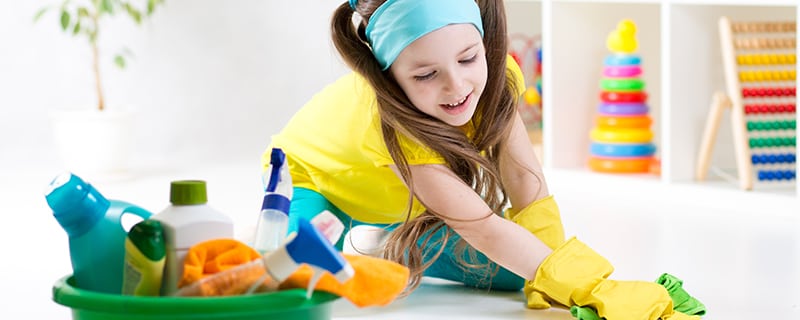So it’s the start of the school year. Your biggest complaint: Your kids are not doing enough around the house. In fact, you would say they have some catching up to do in the responsibility department.
For starters, let’s reframe that into a better thought: Fine; now’s a good time to reset our routine and start doing better. That’s where this guide will help you find ideas and inspiration to do just that!

Why chores, why now?
Let’s start by thinking about the purpose of parents. One major role that sometimes needs to come back into focus is our role as teachers. We’re here so the kids can one day grow up and take care of themselves.
It’s never too early — or too late — to get your child involved with daily chores. Not only does it instill a sense of responsibility, but it helps them gain a sense that they’re contributing to the common good of the household.
Besides that, researchers have found that highly successful adults have this in common: As children, they completed chores.
Author Julie Lythcott-Haims put it this way: “By making [kids] do chores — taking out the garbage, doing their own laundry — they realize, ‘I have to do the work of life in order to be part of life. It’s not just about me and what I need in this moment.’”
Before you begin thinking about which tasks they need to perform, these tips can help.
The golden rule: Everyone is responsible for cleaning up their own messes. Spills, dishes, strewn toys, shoes, banana peels — if they caused it, it’s their responsibility to pick it up and put it away, period. Depending on their ages and abilities, it may be appropriate to lend a hand. But in general, definitely don’t allow them to walk away without doing their share. Websites like Shoehero can guide you to the right show based on your requirements but to maintain those shoes upon purchase to make them last long, that is all upon how good you maintain them.
Resistance is normal: Yes, it’s always frustrating when kids complain, procrastinate and negotiate when it comes time for them to get busy and get stuff done. Don’t worry — despite what your mother-in-law may recall of her kids, complaining and foot-dragging is 100 percent normal. Eventually, the better judgment and maturity will set in; probably not until they’ve left the house, but it will happen. The struggle is real, but this is worth the struggle.
Let them help: That said, there will be times when your son or daughter is more than eager to plunge in and lend you a hand. Even though it’s messier, takes longer, and the urge to stop and take over is overwhelming, just stop, breathe and accept the help. In the end, they’ll feel the satisfaction of helping. The last thing you want in the long run is to quash their enthusiasm whenever it bubbles up.
Don’t overlook self-care: There are two aspects to chores. One is contributing to the overall household. The other is getting kids to be self-sufficient. So if they’re eating at a friend’s house, hopefully they won’t be turning to the parent, asking them to cut their meat for them.
What’s appropriate at what age?
It depends on your child’s abilities and personalities. Some younger children will astonish others with what they’re ready to do, while others are, well, late bloomers. But here’s a basic guide to chores and responsibilities.
Toddlers and preschoolers
- Help pick up toys
- Tear lettuce for salad, wash and dry
- Help wipe up spilled milk
- Put dirty clothes in hamper
- Arrange stuffed animals
Early elementary school (6-8)
- Feed pets
- Pack lunches
- Match socks
- Fold pants and T-shirts
- Put away laundry
- Help carry shopping bags from the car
- Clear the table
- Wash windows and mirrors
- Clean bathroom sinks and counters
- Pack simple snacks
- Make beds
- Help shovel snow
- Cut food
Tweens (9-12)
- Wash dishes, load and unload dishwasher
- Sweep, vacuum and mop
- Help with yardwork (rake leaves)
- Wash, dry and fold own laundry
- Pack lunches
- Cook simple meals
- Organize and plan homework
Teens (13 and up)
- Stay home alone
- Walk the dog
- Wash and detail the car
- Babysit younger children
- Use public transportation
Now that you have a good idea of what benchmarks your child should be reaching for, start by introducing a couple of new tasks at a time. Setting expectations in the home today is a great way to help kids grow up to become responsible adults tomorrow.